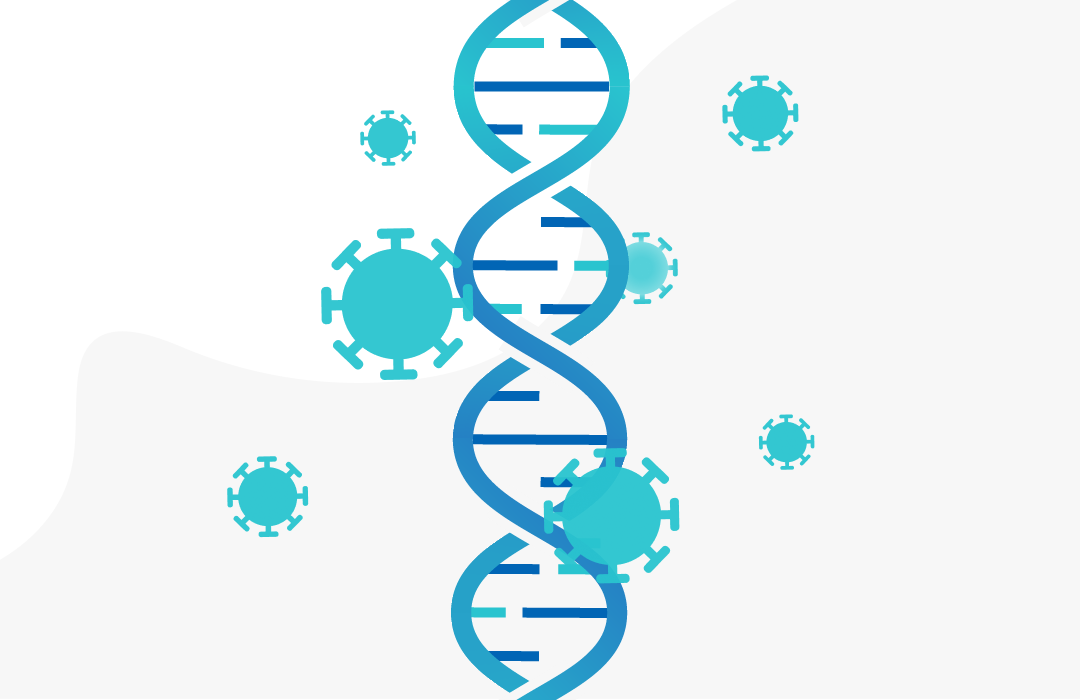
Can a pill cure COVID?
October 25, 2021

This article has not been updated recently
- Do we need drugs for treating COVID?
- What is ivermectin?
- Does ivermectin work against COVID?
- What is molnupiravir?
- Does molnupiravir work against COVID?
- Prevention is better than cure
We take a look at the science behind the two drugs that have been put forward as COVID treatments: ivermectin and molnupiravir.
Do we need drugs for treating COVID?
While many people with COVID-19 are only mildly ill or have no symptoms at all, others can become severely ill, leading to hospitalisation or in the worst cases, death.
Although a significant proportion of the UK population has now had at least two doses of a COVID vaccine, no vaccine can provide 100% protection - especially for people whose immune systems might not work as well - and there are still many adults and children who haven’t had a jab at all.
Since the earliest days of the pandemic, researchers have been racing to find drugs that can help treat severe COVID and save lives. Some of these are existing drugs that are already used to treat other conditions (known as repurposing), while others are brand new therapies that are being developed by pharmaceutical companies.
However, while there are lots of ideas for potential treatments, it’s essential that each one is properly tested in clinical trials before it’s rolled out on a large scale, to show that it actually works to reduce serious illness and deaths from COVID, and that it is safe.
For example, we already know from the UK RECOVERY trial, that the cheap steroid dexamethasone can help with severe COVID while the wrongly-lauded hydroxychloroquine can’t. There are trials ongoing all around the world in search of further drugs to add to the list.
Without reliable clinical trial results, we will end up wasting time, money and lives by giving people treatments that don’t work or are harmful.
What is ivermectin?
Ivermectin is a highly effective anti-parasite drug discovered in 1975 by William C. Campbell and Satoshi Ōmura, who went on to win a Nobel prize for their work.
It’s either taken by mouth as pills or paste, or rubbed into the skin, and is widely used across the world to treat a range of parasite infections, including head lice, scabies and roundworms in humans, and heartworms and mite infestations in animals.
When the pandemic struck, some researchers wondered if ivermectin could be repurposed to treat this new disease, even though COVID-19 is caused by a virus (SARS-CoV-2) rather than a parasite.
Researchers had previously shown that ivermectin could be effective against various viruses in tests using cells grown in the lab. However, these intriguing initial lab results haven't actually worked in wider studies. Ivermectin had no effect on preventing Zika virus infection in mice, and a clinical trial in Thailand showed that the drug didn’t help people infected with Dengue virus.
But when a study published in June 2020 showed that ivermectin could stop the SARS-CoV-2 virus from multiplying in monkey kidney cells, people wanted to know whether it could be repurposed to treat COVID-19.
Since then, ivermectin has hit the headlines around the world, particularly on social media, with many people seeing it as a way to treat or prevent COVID-19.
Prescriptions for ivermectin have gone up by 70% during the pandemic and there are reports of people taking animal medications when they can’t get hold of the human version, causing a shortage of the drug for treating parasites in livestock.
But is there any evidence that it works?
Does ivermectin work against COVID?
The short answer is no.
There is no reliable clinical trial data to show that ivermectin is effective for either treating or preventing COVID-19. A statement supported by the drug’s manufacturer, Merck.
(And no, the fact that the people who discovered ivermectin could treat parasitic infections won a Nobel prize doesn’t prove that it can treat COVID either.)
A few clinical trials have claimed to show that ivermectin can prevent COVID deaths. But all these positive studies have been shown to have serious problems with the reliability of the methods and the data, including claims of data manipulation and ethical violations. And combined analyses of ivermectin trials (meta-analysis) that show a benefit have been criticised for using unreliable and poor quality data.
The confusion around misleading trial results for ivermectin has allowed conspiracies and misinformation to flourish online, with a high likelihood of causing real harm. For a start, taking large doses of ivermectin or animal versions of the drug can be very harmful - the FDA has a good rundown of the risks.
People with COVID-19 who choose to take ivermectin will miss out on treatments that are known to be more effective. There’s also a risk that people will incorrectly use it to protect themselves instead of vaccination, which we know is safe and highly effective.
Check out ZOE COVID Study director Professor Tim Spector’s video about ivermectin for treating COVID to find out more.
What is molnupiravir?
Molnupiravir is a new antiviral pill developed by Merck, who also make ivermectin.
Molnupiravir is a chemical that looks very similar to the molecular building blocks (nucleotides) that the SARS-CoV-2 virus uses to make copies of its genetic code (RNA) when it infects cells.
When molnupiravir gets incorporated into the viral RNA instead of regular nucleotides, it causes dramatic changes to the genetic code meaning that the virus can’t be copied any more, stopping the infection in its tracks.
Does molnupiravir work against COVID?
So far we only have one set of clinical trial results for molnupirivir, which were recently announced in a press release from Merck.
This was a trial of 775 unvaccinated volunteers with mild to moderate symptoms of COVID-19 who hadn’t yet been hospitalised, and included people with a range of virus variants including Delta, Mu and Gamma.
Half of the volunteers were given molnupiravir and half were given a dummy (placebo) drug. A month later, researchers found that 7.3% of patients who got molnupiravir were either hospitalised or died, compared with 14.1% of patients who got the placebo - a drop of 50%. No deaths were reported in patients given molnupiravir, compared to 8 deaths in patients who received the placebo.
These results are promising, especially as the drug can be given as a pill rather than an intravenous injection like other COVID treatments.
Predictably, the results quickly made the headlines, with one newspaper describing it as a “miracle pill that will halve COVID death risk.” However, although the results for molnupiravir sound impressive, they haven’t yet been published in a peer-reviewed scientific journal so we don’t know for sure how well they stand up to scrutiny.
There are a few other important things to note:
- This is still a relatively small trial, and will need repeating in larger numbers to be sure that the drug is safe and effective
- The study did not include pregnant women and people with underlying health conditions, so we don’t know if it can help these people
- It has only been tested on unvaccinated people with early symptoms of COVID-19, not people who were already vaccinated, seriously ill or in hospital
- It is very expensive, costing around $700 per 5-day course in the US (around 40 times what it costs to make)
Check out Tim’s video about molnupiravir for treating COVID to find out more.
Prevention is better than cure
Despite the advances in treatment, the best way to reduce your risk of being seriously ill or dying from COVID, or getting Long COVID, is to not get it in the first place.
Prevention is always better than cure, and protective measures like vaccination, social distancing and mask-wearing help to protect us all.
Stay safe and keep logging.












.png)


.jpg)













.png)







%202.png)
.png)


















.png)




%20(1).png)


